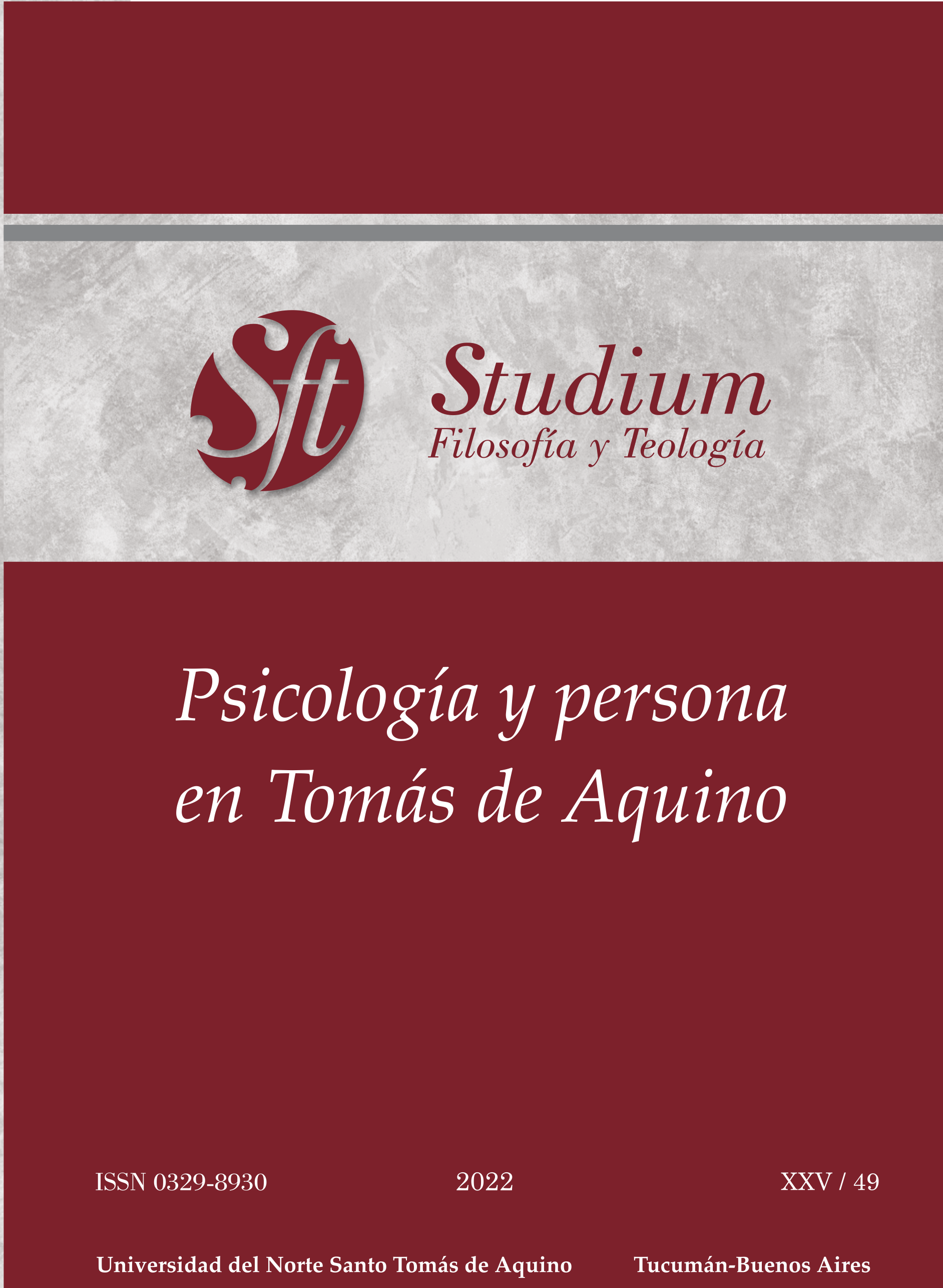Act of being, nature and Psychology: some notes on the psychological interpretation of the concept of person
DOI:
https://doi.org/10.53439/stdfyt49.25.2022.129-140Keywords:
person, nature, personality, individualAbstract
Psychology is presented from its beginnings as an empirical science, distancing itself from Philosophy. This independence brings with it a series of difficulties of an epistemological nature, one of them consists in the lack of consideration of the philosophical distinction between person and nature in the field of Psychology. Ignorance of the traditional meaning of these concepts entails relevant semantic consequences for the discipline. Through a brief review of their meaning in Thomas Aquinas, it is shown how their understanding affects the investigation of personality and the practice of clinical psychology.
Downloads
References
Allport, G. W. (1986). La personalidad. Su configuración y su desarrollo. Barcelona: Herder (edición española de Pattern and Growth in Personality, 1937).
Alano de Insulis. Regulae de sacra theologia. En J. P. Migne (1844-1855).Patrologiae cursus completus. Series latina. https://patristica.net/latina/
Bermúdez Moreno, J. J., Pérez-García, A. M., Ruiz Caballero, J. A., Sanjuán Suárez, P. y Rueda Laffond, B. (2011). Psicología de la personalidad. Madrid: UNED.
Bibliographia Thomistica. Collecta ab Enrique Alarcón ac instucta ad Universitatis Studiorum Navarrensis Aedes Pampilonae ab MMI A.D. http://www.corpusthomisticum.org/izbiblio.html
Boecio. De duabus naturis. En J. P. Migne (1844-1855). Patrologiae cursus completus. Series latina. https://patristica.net/latina/
Canals, F. (1994). Ser personal y relación interpersonal. En E. Forment (Ed.), Dignidad personal, comunidad humana y orden jurídico. Barcelona: Balmes.
Caprara, G.V., Barbaranelli, C., Borgogni, L. & Perugini, M. (1993). The Big Five Questionnaire. A new questionnaire to assess the five-factor model. Personality and Individual Differences, 15(3), 281-288.
Caprara, G. V. & Cervone, D. (2000). Personality: Determinants, dinamics and potentials. New York: Cambridge University Press.
Cicerón (2019). Sobre las leyes – De officiis. Buenos Aires: Coligüe.
Cloninger, C. (1998). The genetics and psycholbiology of the seven-factor model of personality. In K. R. Silk (Ed.), Biology of personality disorders (pp. 63-92). Washington, DC: American Psychiatric Press.
Costa, P. & McCrae, R. (1994). Stability and change in personality from adolescence through adulthood. In C. F. Halverson, Jr., G. A. Kohnstamm & R. F. Martin (Eds.), The developing structure of temperament and personality from infancy to adulthood (pp. 139-150). Hillsdale: LEA.
Echavarría, M. (2010). Persona y personalidad. De la psicología contemporánea de la personalidad a la metafísica tomista de la persona. Espíritu, LIX(139), 207-247. https://revistaespiritu.istomas.org/persona-personalidad-la-psicologia-contemporanea-la-personalidad-la-metafisica-tomista-la-persona/
Fortunat Stabl, J. (2015). De cómo el hombre llegó a ser persona: Los orígenes de un concepto jurídico-filosófico en el derecho romano. Revista de Derecho de la Pontificia Universidad Católica de Valparaíso, 45(2), 373-401. http://www.rdpucv.cl/index.php/rderecho/article/view/1074
Funder, D.C. (2001). Personality. Annual Review of Psychology, 52, 197-221. https://doi.org/10.1146/annurev.psych.52.1.197
Goldberg, L. (1990). An alternative “description of Personality”: The Big Five factor structure. Journal of personality and social Psychology, 59(6), 1216-1229. https://doi.org/10.1037/0022-3514.59.6.1216
Lluis-Font, J. M. (2002). Personalidad: Esbozo de una teoría integradora. Psicothema, 14(4), 693-701. https://www.psicothema.com/pii?pii=786
Mc Adams, D. P. (1997). A Conceptual History of Personality Psychology. In R. Hogan, J. A. Johnson & S. R. Briggs (Eds.), Handbook of personality psychology (pp. 3-39). Academic Press. https://doi.org/10.1016/B978-012134645-4/50002-0
Ribas Alba, J. M. (2012). Persona desde el derecho romano a la teología cristiana. Granada: Comares.
Ricardo de San Víctor, De Trinitate. En J. P. Migne (1844-1855). Patrologiae cursus completus. Series latina. https://patristica.net/latina/
Sibley, C. G., Harding, J. F., Perry, R., Asbrock, F., & Duckitt, J. (2010). Personality and prejudice: Extension to the HEXACO personality model. European Journal of Personality, 24(6), 515–534. https://doi.org/10.1002/per.750
Svrakic, D., Draganic, S., & Hill, K. (2002). Temperament, character, and personality disorders: etiologic, diagnostic and treatment issues. Acta Psychiatrica Scandinavic, 106(3), 189-195. https://doi.org/10.1034/j.1600-0447.2002.02196.x
Tomás de Aquino. (1869). Commentum in Quattor Libros Sententiarum Magistri Petri Lombardi. En Opera omnia ad fidem optimarum editionum accurate recognita, tomo VII. Parmae: Fiaccadori.
Tomás de Aquino. (2001). Suma de Teología. 3ra. ed. Tomos I-IV. Madrid: BAC.

















